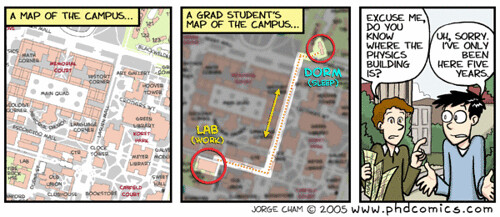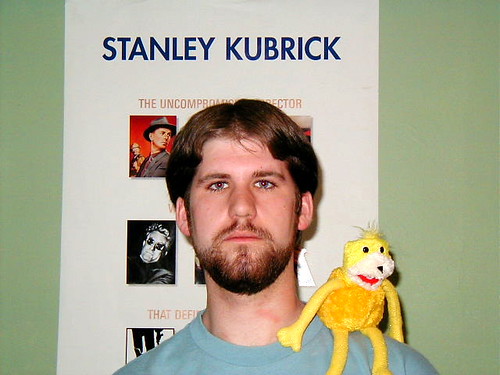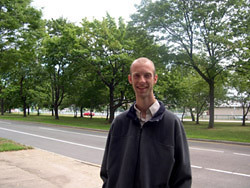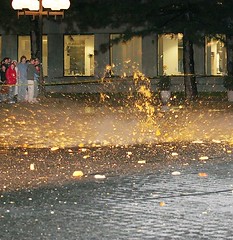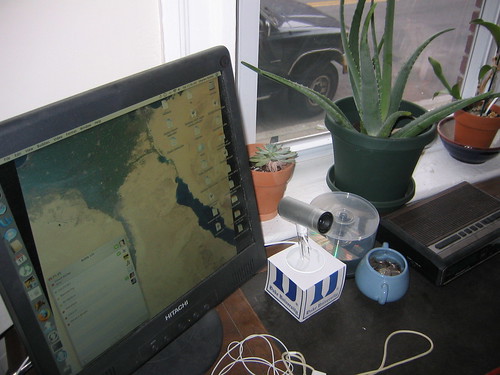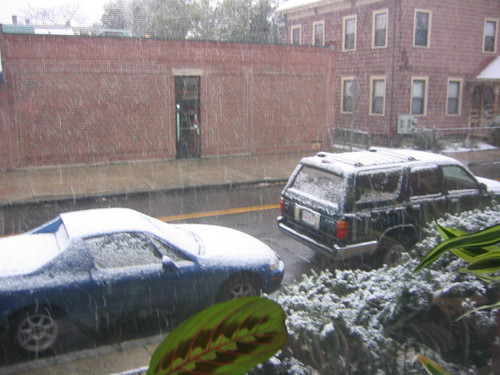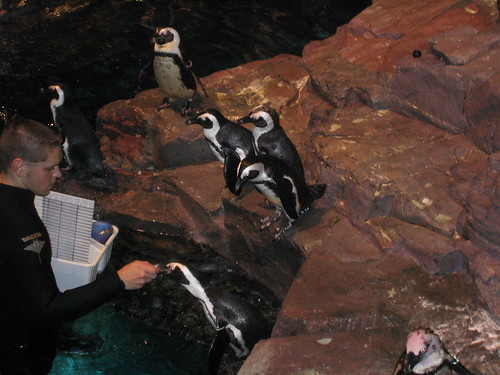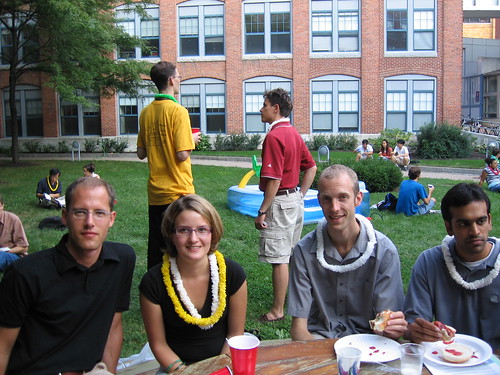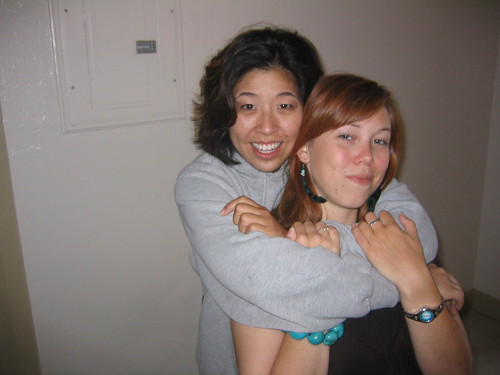As the sun sets on another year, I wish all my loyal blog readers a Happy New Year!
I'm currently out in Woodside, CA for the month, spending new year's eve with my good friend Kim and enjoying the warm weather!
Looking forward to seeing Natalie, Eric, Kristin, Ali, Kelan, Meera and all my other good friends who are in the Bay area!
Saturday, December 31, 2005
Happy New Year!
Tuesday, December 20, 2005
Finals are over!
Had my last final (game theory) this afternoon. So glad to have a break from MIT. Though I will miss it I'm sure. Two days to relax and enjoy Cambridge and then I fly back to Marietta on the 23rd until the 29th for a reunion with family and friends. I'll be offline during that time. I fly out to CA Dec. 30th.
In other news, my paper was accepted at the Babson Entrepreneurship Conference in Indiana for June 2006!
Blogging article
Check it out. Here's an excerpt:
"Fundamentally, blogs are part of a larger, ongoing trend in society that recognizes that true creativity in any area, whether it's in culture or technology, thrives when the power to innovate is distributed to people who will use it, care about it, and consume it. MIT Professor Eric Von Hippel articulates this view most clearly in his book Democratizing Innovation. Those who are starting to grasp this are creating easy-to-use tools to allow users to be the entrepreneurs and innovators of content and culture. Letting users innovate by providing them with new tools allows the emergence of applications and content that the tool makers might never have dreamed of creating."
Thursday, December 15, 2005
Stress 'bad for exam performance'
Researchers at Ohio State University looked at 19 first year students' performances two days before and a week after a classroom test.
They found the ability to deal with complex, open-ended questions improved markedly as stress subsided.
However, the students did better at simpler tasks, such as memorising numbers, while under more pressure.
Tuesday, December 13, 2005
Sunday, December 11, 2005
Lamine Toure
I picked up a copy of the instructor's new CD while there.
Check it out.
Friday, December 2, 2005
Synapse: Current Issue
One of the best things about being at UCSF is the city; San Francisco boasts an amazing array of entertainment outlets for all tastes. I still remember the excitement of moving out to SF a few weeks before classes because I couldn't wait to immerse myself in the music scene. The evening after I arrived, I headed out to Bimbo's 365 in the North Beach neighborhood (hoping I could figure out the bus system to get there). That night I witnessed an excellent electronic/post-rock concert by Mum in one of the city's finest venues, and also had the chance to talk about the City with Belle & Sebastian singer Stuart Murdoch on the street during my trek home; it was great to be living in San Francisco. Over the past year I've been to countless concerts, films and visual arts events, and now I want to share my city entertainment guide with the UCSF community.
I'll start with the form of entertainment I enjoy the most, music. The music scene here in the Bay Area is quite unique and includes especially strong contributions in the genres of hip-hop, electronica and psych-rock. Some of the key players include artists like DJ Shadow with his Quannum Projects label, kid606 and his Tigerbeat6 label, along with rock bands like Erase Errata, Deerhoof, and Animal Collective.
Tuesday, November 29, 2005
advice from a she-geek on dating and relationships
Advice from a she-geek on dating. Why did I not find this months ago?
She-geek, number 2. This is an amusing on-going column in the student newspaper.
Thursday, November 24, 2005
So what do you have to do to find happiness?
So what do you have to do to find happiness?
Are we wired up to be cheerful, or are some of us destined to languish in abject misery? Dorothy Wade reports on the new science of feeling good
Behind the neoclassical facade of the Royal Institution, in London's Mayfair, the latest in a 200-year series of lectures was taking place in a hushed amphitheatre this summer. Standing on the shoulders of scientific giants such as Faraday and Dewar were three academics debating "Happiness, the science behind your smile".
Purists might imagine the founding geniuses of the Royal Institution turning in their graves. What does science have to tell us about such a frivolous subject? And how do you define happiness, let alone study it? But happiness has finally burst out of the academic closet.
Wednesday, November 23, 2005
Effect of Blogs on Culture
Blogs As Innovation Tools for Culture
What is a blog? It’s personality. A prosthetic device for your entire being.
- Henry Copeland, founder of Blogads at iBreakfast on 22nd September 2004
This quote brings out the true flavor of most blogs as highly personal, time-stamped slices of how the individual blogger uniquely sees the world.
What’s a blog, you ask? In case you’ve been living in a cave for the past few years, blogs (or web-logs) are the latest Internet communication tool to garner widespread popularity. Essentially, blogging tools, such as Blogger.com, allow anyone who isn’t an expert in HTML code to create and publish frequently updated online journal postings.
So what’s all the hype about? As a Ph.D. student at MIT Sloan and a blogger for about six years now, I’d like to present a wider perspective on the phenomenon of blogs in our culture, rather than recycling the stale, worn-out pronouncements of blogs as the new printing press, the new iteration of the web, and so on ad nauseam. Fundamentally, blogs are part of a larger, on-going trend in society of recognition that true creativity in any area, whether it’s in culture or in technology thrives when the power to innovate is distributed into the hands of the people who will use it, care about it, and consume it. MIT Professor Eric Von Hippel articulates this view most clearly in his book Democratizing Innovation. Those who are starting to grasp this are creating easy to use tools to allow the users to be the entrepreneurs and innovators of content and culture rather than trying to dictate from some top floor boardroom what the final product or service should look like.
Instead of one view of world events syndicated from the AP wire, homogenized to fit a mainstream audience, blogs offer creative ideas along with multiple and varied perspectives on issues and events. The beautiful thing about blogs, especially when teamed with blog aggregators (such as bloglines.com) is that you can read just the focused type of content in the colorful style of delivery that suits you. Rather than ‘surfing’, it’s the more satisfying experience of ordering the precise gourmet meal you always wanted. In addition, blogs are interactive since you can speak back via comments for all to see. It’s a shift from mass homogeneous communication in one direction only, to varied niche communication in which specialized interests can find each other and share ideas in both directions. History shows that when widely dispersed individuals with niche interests can connect, relate, and recombine their thoughts in new ways, this is where fresh ideas and imaginative new aspects of culture come into being. Blogs then allow newly recombined ideas and cultural artifacts to rapidly spread around the world.
The ability to create your own multimedia ‘magazine’, filled with content you want to see is the essence of users creating their own products with companies getting out of the way and providing the means to let it happen. This type of tool, combined with ever cheaper computing power allows another, complementary trend. If blogs are a prosthetic device for your personality, then they are a rather crude one at the moment. Soon, however, server space and data storage will be cheap enough to allow large portions of ourselves, and our lives to be captured, via text, audio (e.g. podcasting and Odeo), photos, and video, and shared publicly on the web if we so choose. It’s as though the public commons is growing exponentially to include more of the thoughts that we choose to share.
Thus, blogs are affecting culture by substantially increasing the amount and accessibility of informal, personal knowledge. Blogs are a unique source of time linked recordings of what many, many different people were thinking, informally about a range of topics, at specific moments in time. Whether you’re looking for how a venture capitalist sees the world, wondering how people perceive a new product or service, or curious about the life of an American living in Vietnam, blog search tools can present, chronologically, the thoughts of hundreds of people relevant to your topic at your fingertips.
The MIT Media Lab’s new $100 laptop project is further accelerating the spread of low cost computing around the world. A new startup project that I am involved with called Miranda Stories is creating educational software for these low-cost devices. With the falling cost of information technology, more tools such as blogs that allow for people to innovate and share these innovations become accessible to larger fractions of the world. This will allow new technology, art, and culture to form at an unprecedented rate and it will allow the development of subcultures and the blending of ideas across cultures as never before.
Chuck Eesley is currently a first year doctoral student at the MIT Sloan School of Management specializing in the economics of Technological Innovation and Entrepreneurship. He received his BS from Duke University in 2002. During the past two years he has worked as a research assistant at the Duke University Medical Center and the Center for Health Policy, Law, and Management. He has also worked with and consulted several startups, including current fundraising efforts as co-founder (with Ann McCormick) of Miranda Stories, a startup planning to ride the tide of low-cost computing reaching hundreds of millions of people with high quality, powerful, playful learning for all.
Monday, November 21, 2005
Meditation
Interesting.
Sunday, November 20, 2005
B.B. KING - SHE'S DYNAMITE LYRICS
Met a lot women who could love alright
But nothing like the woman I met this night
She's dynamite, she's dynamite
She knows what to do
And she knows what it's all about
Now men don't blame me because I've been around
I don't understand what's she's putting down
She's dynamite, she's dynamite
She knows what to do
And she knows what it's all about
Now she don't drink liquor and very little gin
But she'll show you how, you just tell her when
She's dynamite, she's dynamite
She knows what to do
And she knows what it's all about
She's got a peal handled pistol
A knife and a razor too
You can't ever tell her, she'll always tell you
She's dynamite, she's dynamite
She knows what to do
And she knows what it's all about
Monday, November 14, 2005
Xing Hu, from Dream Corps came into town last weekend for a conference at Harvard and visited me. She made a really delicious authentic dinner of Chinese food for us!
This past weekend the conference I went to at Northwestern was good. I got to visit my cousin Stephie, Steve, and Cameron as well as hang out with Katie Craig and Betsey Hoffman. We had quite an intense game of trivial pursuit in Evanston, IL including 3 Marietta High School valedictorians!
Tuesday, November 8, 2005
News @ MIT Sloan
News @ MIT Sloan ran an article on B-School Bloggers: "The potential to connect not only with ideas but with other people is a big part of what motivates Chuck Eesley, a PhD student in the Technological Innovation and Entrepreneurship group, to work on not one, but four blogs: one personal, one for research, one on environmentally friendly technologies, and one in which he examines what the popular press has to say about his research topics.
Sunday, November 6, 2005
Global Entrepreneurs Conference
Students seeking to be international business leaders and to make a difference in the world are invited to apply to a two-day Global Entrepreneurs Conference at Northwestern University. The conference aims to prepare current students to be successful and socially responsible entrepreneurs in our rapidly globalizing world. At the conference, young entrepreneurs will have an opportunity to discuss the changing face of entrepreneurship with leading globalization scholars and socially conscious business executives. Conference attendees will also have the opportunity to meet and exchange ideas with a network of young global entrepreneurs, equipping them with the knowledge, support and structure to start-up innovative, globally conscious projects. The conference, including tuition, lodging, and meals, is free for selected participants thanks to the generous support of the Kauffman Foundation.
Wednesday, November 2, 2005
MIT Pumpkin Drop
Sunday, October 30, 2005
Miranda Stories
"Inspired by Y Combinator, an angel investor that specializes in software start-ups, MIT Sloan School of Management student, Chuck Eesley, rounded up industry giants to became founders in a tiny new company with a big idea.The vision which unites this group is to build innovative English Language Learning software for the new generation of low-cost computers and bring high-quality, engaging educational opportunities to millions in the U.S. and around the globe."
Saturday, October 29, 2005
PUMPKIN DROP - Sat., Oct. 29th @ 11:59 PM
SNOW!
Tuesday, October 25, 2005
More mathematicians
In other news, the new Chairman of the Federal Reserve is an MIT econ PhD. Somehow it comforts me that he suffered through the same classes I'm suffering through currently.
Saturday, October 22, 2005
Infrequent Musings
"On September 30 2005 I defended (and passed) my doctoral dissertation oral exams. It is such a great feeling to be done with much of the formal parts of my "higher" education. At the same time I have a feeling that this is just the beginning . . . Aga Shahid Ali's wonderfull book of poetry Rooms Are Never Finished provides an apt title to my post and captures my view that scholarship is a journey."
One of the Sloan MBA's (SDM) blogs here.
Saturday, October 15, 2005
Tuesday, October 11, 2005
Gosset
Many people are familiar with the name "Student"; but not with the name Gosset. In fact Gosset wrote under the name "Student" which explains why his name may be less well known than his important results in statistics. He invented the t-test to handle small samples for quality control in brewing. Gosset discovered the form of the t distribution by a combination of mathematical and empirical work with random numbers, an early application of the Monte-Carlo method.
McMullen says:-
To many in the statistical world "Student" was regarded as a statistical advisor to Guinness's brewery, to others he appeared to be a brewer devoting his spare time to statistics. ... though there is some truth in both these ideas they miss the central point, which was the intimate connection between his statistical research and the practical problems on which he was engaged. ... "Student" did a very large quantity of ordinary routine as well as his statistical work in the brewery, and all that in addition to consultative statistical work and to preparing his various published papers."
Monday, October 10, 2005
Learning Friends - Quest
We're currently looking into a possible project to adapt LF's educational software for these MIT prototype laptops.
Learning Friends is an early stage company determined to solve the learning problem of children at home and at school. At this stage, we are raising funds.
Challenge
Approximately one third of the U.S. population is functionally illiterate. In addition, a vast majority of children aren't prepared for the complexity of life in the 21st century. Learning Friends will revolutionize the education process, making it possible for children who use the Learning Friends service to master not only the basics, but "expanded basics," how to learn, adapt and apply their knowledge in a global environment. Learning Friends will offer the solution to the learning problem, both at home and at school.
Mission
Enable children ages 4-9 to master an expanded set of basic skills, including how to learn, adapt and choose in a global environment.
Friday, October 7, 2005
Official: World not ready for flu
Sunday, October 2, 2005
Learning from one or fewer
"Near-histories are useful antidotes to a tendency to over generalize from the drama of great disasters or victories (Fischhoff 1982). For example, students of the Battle of Midway have suggested a number of quite likely alternative scenarios for that battle that would have led to notably different outcomes (Prange 1982). Future admirals learn not only from the battle but also from its near-histories. Standardfolkloric observations that great failures often are the consequence of bad luck or timing and great successes the consequence of good luck or timing suggest an implicit distribution of possible outcomes around the observed outliers. They emphasize that the near-histories of genius and foolishness are more similar than their realized histories."
-- from March, Sproull, and Tamuz 1991 - titled "Learning from Samples of One or Fewer", published in Organization Science
Friday, September 23, 2005
Red Sox
I saw my first game at Fenway last Saturday with a few of the other PhD students at Sloan and one of the creators of Amabuddy.com
It was a good time. Unfortunately, I think the wet seats contributed to my getting sick the next day though.
Wednesday, September 21, 2005
NATIONAL BUREAU OF ECONOMIC RESEARCH
NBER Schedule
10:15 AM DAVID HSU, University of Pennsylvania
Entrepreneurs from Technology-Based Universities: An Empirical First Look (Joint with EDWARD ROBERTS AND CHARLES EESLEY)
Saturday, September 17, 2005
sigur ros
Wednesday, September 14, 2005
Kelan's Kalendar
Now if only he'd link his audioscrobbler page on it . . .
Kelan's Kalendar: "Upcoming Bottom of the Hill Shows - September Calendar9/16 - BOOM BIP - This Cincinatti-based instrumental hip-hop producer had the honor of releasing the very first album 'Seed to Sun' on Warp Records' hip-hop imprint, Lex. Listen: Boom Bip samples"
Grad student orientation
This is from the Edgerton Luau, one of the grad student orientation events. Unfortunately orientation is over and classes (and homework) have started.
Monday, September 12, 2005
Innovation and Entrepreneurship
Monday, September 5, 2005
Boston Harbor
I dragged my roommate Cindy to go on a Boston Harbor Cruise last night organized by the graduate student orientation. While it wasn't exactly what I expected, there were some nice views of the city. Like this one. (I didn't take this picture though, none of mine came out.)
Friday, September 2, 2005
On the future . . .
Me: I can't wait to get chips in my head. I want the Google wireless chip. I could just think the "search" and the answer pops into my head.
Cindy: I don't know. Wouldn't that make information lose its value since everyone would have access to the same information all the time (assuming everyone had the chip).
Me: Well then the economy would shift so that the production of new knowledge would become increasingly valuable.
In retrospect, perhaps it's just an academic's skewed view but, this may already be the shift happening for a long time now regardless . . . but still, if the academic journals were perfectly indexed for this chip, it would make research MUCH easier.
Regarding Hurricane Katrina
Perhaps in time the so-called Dark Ages will be thought of as including our own. ~Georg Christoph Lichtenberg
Sunday, August 28, 2005
To be a child again . . .
his grave little head that adults do not have divine intelligence,
that their judgements are not always wise, their thinking true,
their sentences just--his world falls into panic desolation. The
gods are fallen and all safety gone. And there is one sure thing
about the fall of the gods; they do not fall a little; they crash...
And the child's world is never quite whole again. It is an aching
kind of growing.
- John Steinbeck
Tuesday, August 23, 2005
Poem by Anoopa
Uttama found this poem by Anoopa in her belongings after we cleared her apartment in Atlanta on March 17, 2005. Anoopa spent about four months in spring of 2004 in Bangladesh working on a public health project with CDC. Her mentor was Dr. Carin Burn at Emory. Anoopa had a great time in Bangladesh. She also collected enough data and anlysed it over the Christmas Holidays 2004, and wrote a very complete draft of her research paper....Anyway, here I want to share Anoopa's poem entitled "Living Bangladesh"
Living Bangladesh
I am taking a bucket bath
with cold water in the morning as
steam comes off my body,
I am standing on the roof of the apartment building watching the men
at the rice mill spreading out the rice to dry,
I am eating breakfast while
Raheem the cook watches me (to find out what I like best),
I am walking into the village as men stare
and children trail along behind me with curiosity,
I am entering the village and I am smiling
because I see Rafiqul Islam,
and he recognizes me from our interview last week,
and we are smiling at each other
and I love his eyelashes.
I am practicing my Bangla with him, our conversation
is:
Me: Are you well?
Rafiqul Islam: Yes, I am well. Are you well?
Me: Yes, I am well.
Rafiqul Islam: That is excellent.
And we continue walking.
The ducks are swimming in the ponds,
an enormous cow is blocking my path,
I am chasing after ducklings in the courtyard of a household,
I am picking up a baby goat
after watching a small child to see how he does it,
I am cooing at a baby as her mother, or sister, holds her.
Now I am holding the baby, gingerly, and hoping she won't cry.
I am watching a woman grind red chilies on a stone,
I am asking her her name, and where is her daughter?
She is smiling
and pleased that I have addressed her,
and that I remember her family.
I am interviewing villagers and learning about
the bribes they pay
to doctors and nurses
for the privilege of a supposedly free
hospital bed and supposedly free
treatment for their illnesses.
I am detailing their costs,
their shops abandoned,
their pregnancies complicated,
their mothers lost and replaced,
I am watching a man moaning with fever,
I am watching a father hold his young daughter,
pointing to the spots on her skin where parasites still grow,
listening to him list
the trips he took,
the income he lost,
the land he sold,
the bribes he paid,
to care for this girl, who he swings in his arms.
I feel tears rising unexpectedly to my eyes,
I am thinking of my own father,
of our relationship but also of his humble beginnings,
in a place not unlike this one,
I watch the boys with their English books and I wonder if they,
like my father see education as a way out.
I am walking and talking with Rajib,
who translates for me,
and teaches me most of what I cannot observe myself,
and so much that I do observe,
how he interacts with all the villagers,
right now he is making faces at children,
offering them our leftover lunch,
drawing them out of their shells,
while I, just by smiling at them,
make them retreat back to their shells,
hiding their faces or ducking behind each other.
The sun is shining on these children’s fathers,
who are bent at the waist,
inserting rice seedlings in rows into a wet field,
they are covered with mud and working methodically,
pausing only to watch us pass.
We are stepping over small waterways for irrigation, traveling on raised
pathways through paddy fields in every shade of green.
We are listening as a shout is heard,
there is a fire in the village,
and all the children are running in that direction,
coming back to report only minimal damage.
We are waiting for our next interview and.
Rajib is telling me about all the problems of his country,
the dishonesty,
the greed,
the bad governance,
he tells me he wants to get a PhD overseas and then return,
to help,
to share what he has learned.
I tell him my dad was like him,
but he never came home again.
Rajib insists that he will, and I believe him
because I know his heart lies here,
in these villages,
with these children.
We are riding a bicycle rickshaw home,
we are stopping in the market for bananas,
men are staring at us and asking him where I am from.
We are back on the rickshaw and Raheem, the cook, appears out of nowhere
and jumps on.
Through non-verbal communication our affection for each other is confirmed,
me, an Indian American of 23 years,
and he, a 60-year old Bangladeshi man with
two wives and a village background.
I am arriving home,
I am drinking tea,
I am wondering if it is really possible that I feel a connection with
that woman in the village,
the one grinding chilies,
is it possible to see omens so
far from home?
I am eating fish and removing small bones from my mouth,
I am eating guava with salt and
spitting out seeds,
I am sitting at the dinner table,
with Raheem watching again,
and discussing local politics,
nationwide strikes,
political leaders who go back on their word,
I am watching the rice mill where
they are sweeping up
the rice for storage overnight,
I am reflecting and daydreaming and thinking about friends,
I am wondering about the future, about India and Nepal,
I am debating whether I could ever live in a village and
deciding it is too late for me now,
I know too much and
I owe too much to these villagers themselves,
Since I am privileged and educated.
I am marveling at the beauty of some of them,
How the ones who are
gorgeous by western standards just strike me,
and the irony that they may never be seen by another westerner's eyes,
and that their beauty
may not matter in a village like theirs.
I am wondering
why everyone stares at me,
how do they know just by looking at me that I come
from a place far away?
I am feeling my energy waning but my contentment increasing,
I am arranging my bed net,
I am climbing under the covers as a few remaining rickshaws pass,
their bells tinkling on the road below,
I am drifting off to sleep now,
and all the while
I am Living Bangladesh.
By D. Anoopa Sharma
Spring of 2004, in Dhaka, Bangladesh
Monday, August 22, 2005
Different view for East and West
Westerners' eyes tended to focus on the main subject while the eyes of their Eastern counterparts kept flicking to background details, they said.
The study is published in Proceedings of the National Academy of Sciences.
Monday, August 15, 2005
Leslie and Ali
Leslie and Ali are so cute together! I had fun hanging out with them during my last day in San Francisco before I headed back to Boston.
As soon as Leslie walked in the door she yelled, "Is Chuck Eesley here?!" She then grabbed a camera and tried to snap an impromptu picture of us, only her camera battery was dead. That gave me the chance to snap this shot of the two of them.


